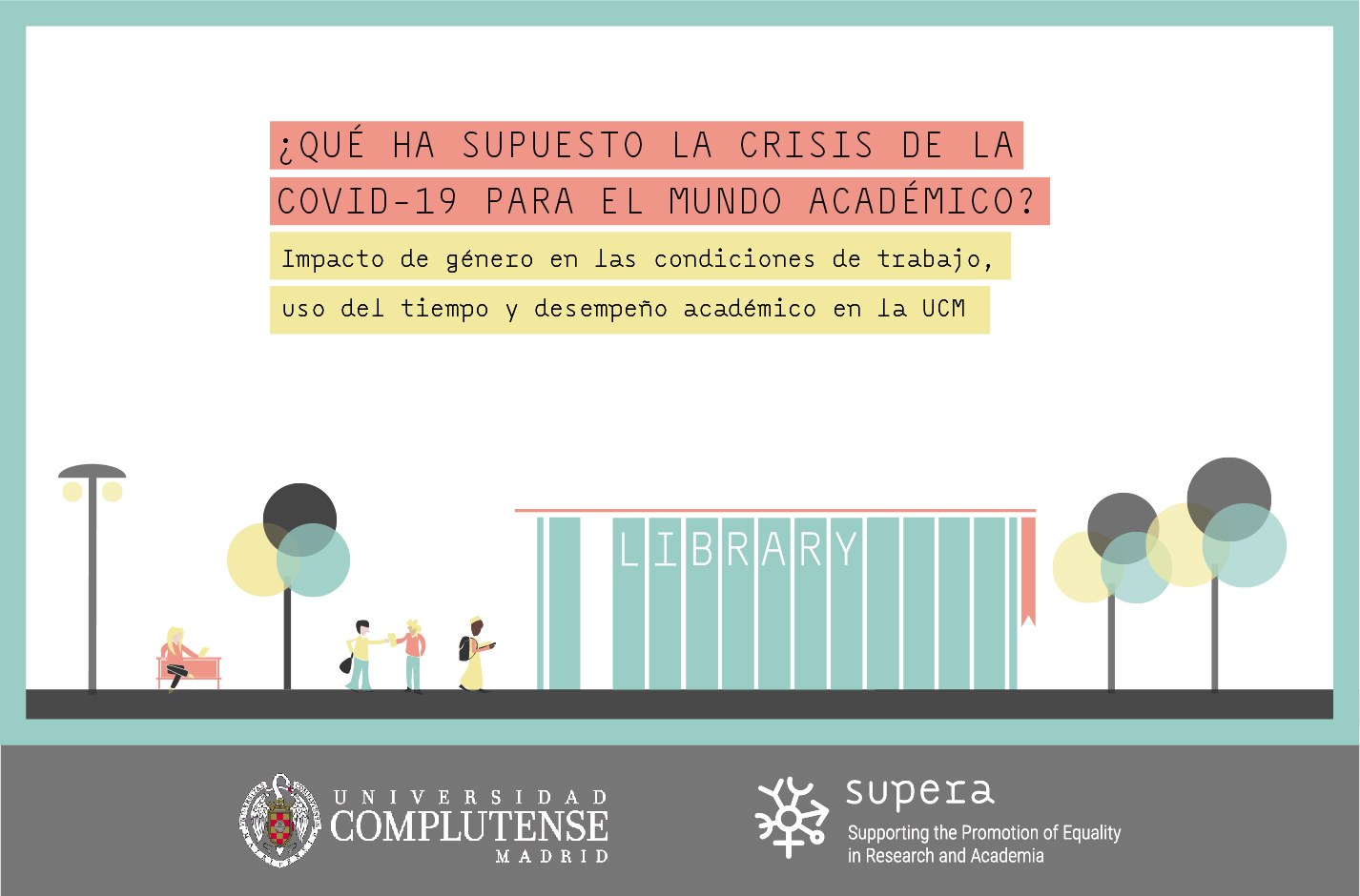By Paula de Dios Ruiz and Lorena Pajares Sánchez, Universidad Complutense de Madrid
On Friday 5th of February, the UCM organised the online presentation act “Gender Impact of COVID-19” in which the UCM – SUPERA Team presented the results of the study done on working conditions, use of time and academic performance during the Covid-19 crisis among the academic staff of the UCM (PDI). Study that was carried out in June 2020, just after the hardest months of confinement and the State of Alarm in our country.
The event counted with the participation of Eva Alcón, Rector of the Jaume I University and Delegate of the Presidency for Equality Policies of the CRUE (Spanish Universities Rectors’ Conference); Magdalena Suárez Ojeda, Director of the Equality Unit at the UCM; and María Bustelo, Coordinator of the SUPERA project. Moreover, around 120 participants attended the event and enriched the discussion with questions and comments about the results. The recording of the event can be found at the UCM – SUPERA website, here.
The UCM – SUPERA Team has also systematised and described all the results of the study in a report, divided in 5 chapters following the surveys’ structure:
1. Academic and sociodemographic variables;
2. Working conditions;
3. Scientific production;
4. Uses of time and perception of efficacy;
5. Institutional support.
One of the main findings to be highlighted is that significant differences between men and women appear in the answers of all chapters of the questionnaire. They reflect the presence of structural gender inequalities that perpetuates the traditional gender roles and stereotypes in academia, which seem to have been aggravated during the confinement and lockdown, as shown in the examples hereafter.
Significant differences are found already when looking into the sociodemographic variables of the UCM’s faculty staff, especially regarding family units, where it is identified that more women than men live with children under 18 years old and that the units with a single adult living with children are mostly headed by women.
As regards the working conditions, female faculty have worse material working conditions than their male colleagues, shown by the fact that fewer women than men have good computer equipment and a working room for their own.
Related to the distribution of reproductive works, women from the PDI of the UCM express to have dedicated more time than men to care and domestic work during confinement, with differences as relevant as 3 more hours per week on average dedicated to housework and cleaning, or caring for minor children. Moreover, it has come to light that the female faculty of the UCM have had less time available for rest, leisure and personal development.
If we focus on the scientific production, male PDI have been working and sending to publish more than the female PDI, with a clear difference in the production of articles for peer-reviewed journals. Analysing the perception of time dedicated to the different tasks of academic work, it can be highlighted that men dedicate more hours per week to writing papers, articles and books, while women dedicate more hours to preparing and teaching classes and exams and attending students.
These are just a few examples of the inequalities yielded by the study, but the overall results clearly outline the underlying academic profile of a successful scientific person: someone who has an exclusive dedication to scientific production, many hours a week invested in research activities and with less dedication to reproductive and care work. Not only at home but also at the university, care works seem to be a female responsibility, where there are tasks which are not recognised and valued on the career’s development criteria, such as preparing lessons or attending students, and those are tasks mainly done by women.
The results must motivate us to continue working on gender equality at the UCM. For this reason, the report ends with a section of recommendations, which is considered a starting point from which to continue designing and proposing measures for the UCM’s GEP, as well as to continue working on the training and capacity building for the promotion of the implementation at all levels and departments of the gender mainstreaming strategy.
The report is available in English and Spanish:
Desigualdades al descubierto en la universidad por la crisis de la COVID-19
Inequalities exposed at the university by the COVID-19 crisis


